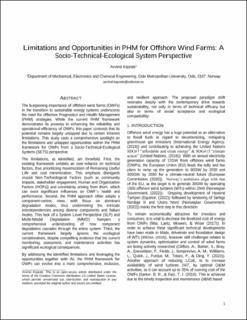| dc.description.abstract | The burgeoning importance of offshore wind farms (OWFs) in the transition to sustainable energy systems underscores the need for effective Prognostics and Health Management (PHM) strategies. While the current PHM framework demonstrates its prowess in enhancing the reliability and operational efficiency of OWFs, this paper contends that its potential remains largely untapped due to certain inherent limitations. This study casts a comprehensive spotlight on the limitations and untapped opportunities within the PHM framework for OWFs from a Socio-Technical-Ecological Systems (SETS) perspective.
The limitations, as identified, are threefold. First, the existing framework exhibits an over-reliance on technical factors, thus prioritizing maximization of Remaining Useful Life and cost minimization. This emphasis disregards crucial Non-Technological Factors (such as community impacts, stakeholder engagement, Human and Organization Factors (HOFs)) and uncertainty arising from them, which
can exert significant influences on OWF’s health and performance. Second, the PHM approach often adopts a component-centric view, with focus on dominant degradation modes, thus undermining the intricate interdependencies among diverse components and failure modes. This lack of a System Level Perspective (SLP) and Multi-Modal Degradation (MMD) hampers a comprehensive understanding of how component degradation cascades through the entire system. Third, the current framework largely ignores the ecological considerations, despite compelling evidence that the current monitoring, assessment, and maintenance activities has significant ecological consequences.
By addressing the identified limitations and leveraging the opportunities together with AI, the PHM framework for OWFs can evolve into a more comprehensive, inclusive, and resilient approach. The proposed paradigm shift resonates deeply with the contemporary drive towards sustainability, not only in terms of technical efficacy but also in terms of social acceptance and ecological compatibility. | en_US |

